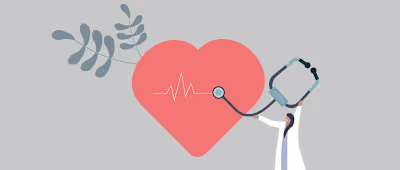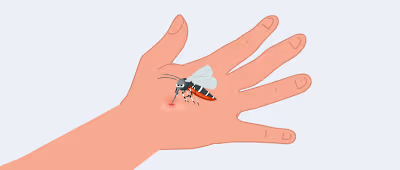Can Anxiety Cause High Blood Pressure?

High blood pressure or hypertension is one of the most common diseases worldwide. In the United States, nearly half of all adults have hypertension, which is defined as blood pressure levels above 130 mmHg (systolic) and 80 mmHg (diastolic).
A lesser-known cause of high blood pressure is anxiety or stress. Please continue reading to find out more.
What are the symptoms of high blood pressure?
In most people, high blood pressure does not cause any warning signs or symptoms. The only way to know you have hypertension is to measure your blood pressure levels.
When present, symptoms of high blood pressure can include headache, dizziness, chest pain, blurred vision, nosebleeds, confusion, nausea, vomiting, and anxiety.
Very high blood pressure (180/120 mmHg or higher) is a medical emergency.
Can an anxiety disorder lead to elevated blood pressure?
Some people have what is called “white coat hypertension” (raised blood pressure in a doctor’s office), and this is believed to be due to anxiety.
When your anxiety symptoms are short-lived, they may cause blood pressure spikes but will not lead to chronic high blood pressure. However, if you have chronic anxiety, i.e., you regularly experience intense anxiety with severe or recurrent symptoms, it can raise blood pressure long-term. Chronic high blood pressure can cause damage to your heart, blood vessels, kidneys, and other organs.
Additionally, people with mood and anxiety disorders commonly practice unhealthy habits such as overeating, smoking, and drinking when they feel anxious, which are risk factors for high blood pressure.
Also, chronic stress and anxiety can be barriers to undertaking lifestyle modifications and/or taking medications to control high blood pressure.
The association between anxiety and high blood pressure is reciprocal because one of the severe symptoms of high blood pressure can be anxiety.
Is there any other link between anxiety and hypertension?
Some medications used to treat anxiety and depression symptoms, for example, serotonin norepinephrine reuptake inhibitors (SNRIs) such as venlafaxine (Effexor), can cause high blood pressure because of their effects on the sympathetic nervous system.
Other anti-anxiety medications, such as selective serotonin reuptake inhibitors (SSRIs) are less likely to increase blood pressure. Examples of SSRIs include citalopram (Celexa), escitalopram (Lexapro), sertraline (Zoloft), paroxetine (Paxil), and fluoxetine (Prozac).
Keep in mind that not everyone who takes these medications for generalized anxiety disorder or depression treatment will necessarily develop hypertension. However, if you have recently started an anti-anxiety drug for mental health conditions and have newly diagnosed hypertension, you should talk to your healthcare provider about potentially changing to another medicine.
Noradrenaline reuptake inhibitors such as reboxetine (Edronax) are considered a safer option due to their neutral effect on blood pressure.
Notably, some medications used for short-term anxiety relief, such as bupropion (Wellbutrin), can cause orthostatic hypotension (low blood pressure when going from a sitting or lying to a standing position).
Does anxiety raise systolic or diastolic BP?
A systematic review of studies found that women experiencing work-related stress have a higher systolic blood pressure compared to women not experiencing stress. However, further studies are needed, controlling for differences in age, gender, lifestyle, and anxiety levels to identify whether anxiety raises systolic blood pressure, diastolic blood pressure, or both.
Is high blood pressure from anxiety bad?
High blood pressure for any reason is bad. Having high blood pressure puts you at an increased risk of heart disease and stroke, which are leading causes of death in the US. That’s why diagnosing and treating high blood pressure is important.
A healthy lifestyle and medications such as beta blockers, calcium channel blockers, and others can help to lower blood pressure and decrease your risk of these serious chronic conditions.
How do you know if anxiety is causing high blood pressure?
You can develop anxiety due to high blood pressure and high blood pressure due to anxiety. Seek care from a mental health professional if you have the following signs and symptoms of anxiety:
Difficulty controlling worrying thoughts
Avoiding things or people that trigger feelings of anxiety
Anxious thoughts in response to perceived threat
A sense of panic, doom, or impending danger
Nervousness
Restlessness
Rapid breathing
Increased heart rate
Trembling
Sweating
Weakness or tiredness
Trouble concentrating or focusing
Trouble sleeping
Gastrointestinal symptoms
How do I stop anxiety from raising my blood pressure?
Some of the things you can do to stop anxiety from raising your blood pressure include:
Stay active and get regular exercise
Eat a balanced diet and limit salt intake
Avoid alcohol
Quit smoking if you smoke
Limit caffeine intake
Get enough sleep
Practice mindfulness, meditation, and deep breathing
Spend time in nature
Engage in hobbies like music and art
If you experience anxiety, the above lifestyle changes may help to control high blood pressure as your anxiety lessens. But it’s important to see your healthcare provider if you have high blood pressure readings at home. Your provider may prescribe medications to reduce high blood pressure if lifestyle changes alone do not control high blood pressure. Early detection and treatment of hypertension can lower your risk of cardiovascular disease and other chronic conditions.
References:
Like this project
Posted Sep 17, 2023
High blood pressure or hypertension is one of the most common diseases worldwide that has many causes. One cause of high blood pressure is anxiety or stress. P…
Likes
0
Views
5



